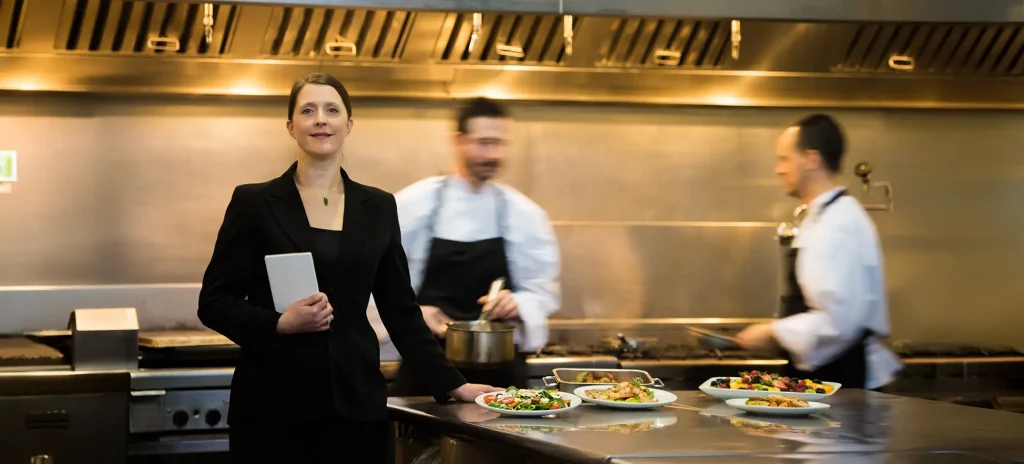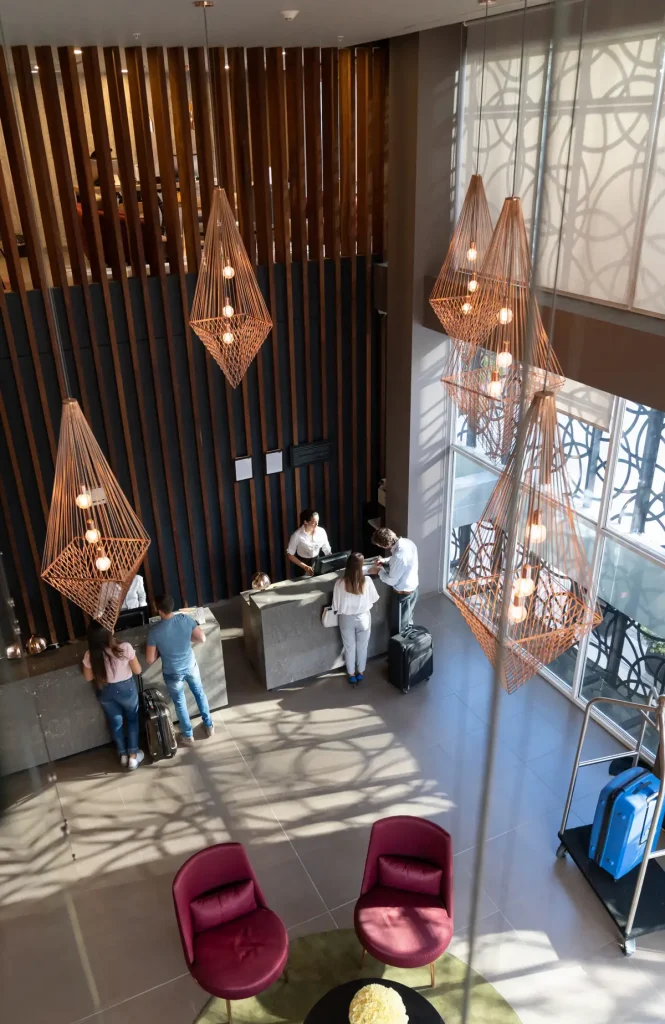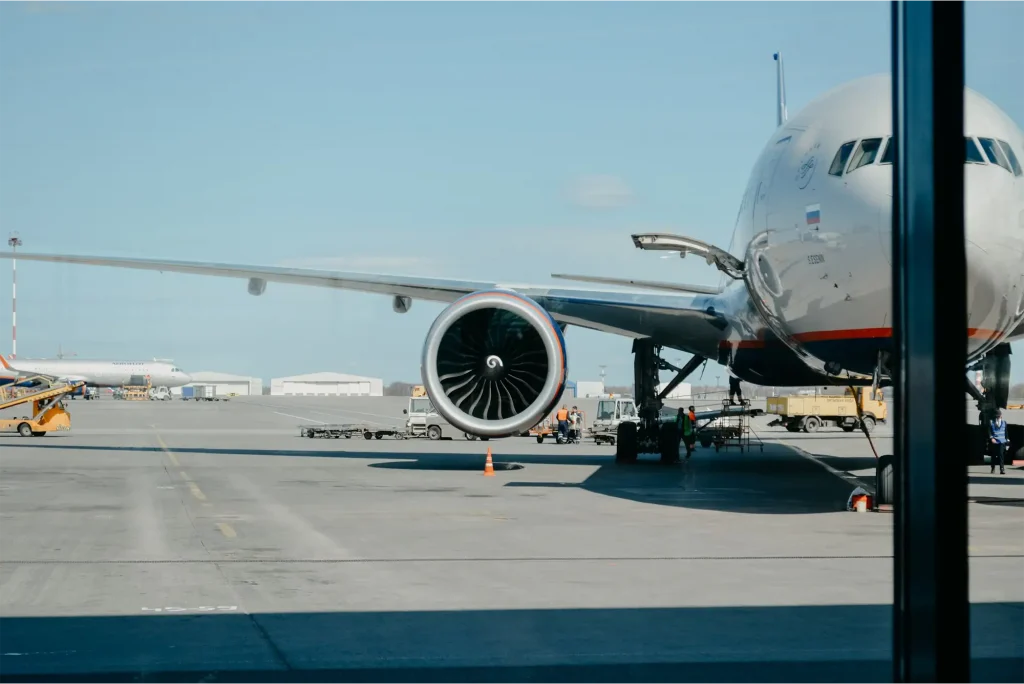Share
Careers with a Tourism and Hospitality Management Master’s Degree

Explore Top Tourism, Hospitality and Event Management Jobs
Tourism, hospitality and event management is a vibrant and ever-evolving profession full of excitement and promise. With career paths in hotels, cruises, restaurants, theme parks, events, tours, and other venues, there’s a niche to suit every interest.
Earning an online graduate degree in tourism, hospitality and event management offers a unique opportunity to expand your knowledge and skills while living and working anywhere in the world.
The University of Florida’s fully online Master of Science in Tourism, Hospitality and Event Management program is designed to boost job prospects for individuals at any stage in their career paths in hospitality. Whether you’re a recent graduate or an experienced professional in the tourism and hospitality industry, this degree can open new doors to help you achieve your professional goals.
With UF’s affordable and flexible online master’s degree program, you can further your education or seamlessly enter the workforce after graduation.
Benefits of Studying Tourism, Hospitality and Event Management Online
Pursuing your master’s in tourism, hospitality and event management online provides unparalleled convenience and affordability in your graduate studies.
As an online student, you will receive the same high level of academic support and engagement from faculty and staff while completing fully online, asynchronous coursework.
UF’s program is designed to accommodate professionals working and living anywhere in the world. This flexibility allows you to earn a degree while working full or part-time without changing your current lifestyle or location.
Career Opportunities with a Master’s in Tourism, Hospitality and Event Management
Earning a master’s in tourism, hospitality and event management opens new career opportunities for graduates looking to advance their careers in tourism and hospitality.
This advanced degree creates new prospects in a wide range of roles, including hotel or resort manager, restaurant manager, cruise director, events director, guest services director, head of food and beverage, revenue manager, and sales manager.
Obtaining a master’s degree can unlock a variety of highly sought-after tourism and hospitality careers and promotions, providing the expertise and credentials needed to excel in fields including hospitality management, tourism development, sustainable tourism, hospitality marketing, and global tourism.
The comprehensive skills gained in the program are also valuable for strategic business management and corporate roles in other industries, offering versatility in career options.
Key Roles in the Tourism, Hospitality and Event Management Industry
There are many fulfilling roles within the tourism, hospitality and event management industry that graduates of UF’s online Master of Science in Tourism, Hospitality and Event Management program can pursue.
This program equips students with a range of skills, including business leadership, communication, problem-solving, and financial management, ensuring that graduates are ready to excel.
Explore some of the most popular career paths available with a graduate online hospitality degree, along with insights into each role’s typical responsibilities, requisite skills, and expectations.
Hotel and Resort Management

Many roles relate to hotel and resort management, each playing a vital part in the successful operation of a hotel or resort and an exceptional guest experience. While a hotel or resort manager often refers to an establishment’s general manager, many other managerial positions are also essential within the lodging industry.
Common managerial roles within hotels and resorts include general manager, food service manager, special events manager, housekeeping manager, and conference center manager. The specific number and type of managers vary depending on the establishment’s size and needs.
A hotel management career is fast-paced and dynamic. Hotel and resort managers oversee onsite operations, requiring a broad understanding of all aspects of the hotel’s functions.
They need to comprehend the roles each department and position plays to keep the hotel running smoothly and ensure guest satisfaction. Those aiming to work in hotel and resort management should be flexible, possess strong communication and leadership skills, be adept at financial management, and understand general marketing practices.
Hotel management should not be confused with hospitality management, which encompasses a wide range of sectors within the hospitality industry.
Destination Marketing and Management

Destination marketing and destination management are distinct yet interconnected career paths within the travel and tourism industry. Both roles are crucial for the growth and sustainability of travel destinations, with destination managers focusing on the operational and environmental operations, and destination marketers concentrating on attracting and engaging potential visitors.
A destination manager oversees many facets of a travel destination, becoming an expert on local sites, activities, accommodations, restaurants, transportation, and more. They are responsible for ensuring sustainable tourism practices to prevent long-term issues resulting from a tourism boom.
Those interested in this field should have strong problem-solving abilities, attention to detail, critical thinking skills, and a broad understanding of marketing and business. Additionally, they need in-depth knowledge of the location they are managing to effectively promote and preserve its environment and appeal.
In contrast, destination marketing focuses on developing strategies to attract potential visitors to a specific destination. This can involve creating ad and communications campaigns, developing promotional materials, and producing destination photography.
Destination marketers enhance a location’s reputation and visibility to the public rather than concentrating on specific activities or packages. This role is particularly important for tourism boards and destinations seeking to increase visitor numbers. They must keep up with tourism industry trends to make sure their client or employer is competitively positioned to attract visitors. Pursuing a career in destination marketing requires a sophisticated understanding of marketing.
Food and Beverage Management

A food and beverage manager oversees all aspects of the food and beverage operations at their establishment, ensuring guest satisfaction, service quality, and staff efficiency. This person manages costs and develops sales strategies, making a solid understanding of business practices essential to job performance.
Typical duties include recruiting and training staff, supervising employees, purchasing supplies, developing menus, maintaining health and safety standards, and tracking customer feedback.
Aspiring food and beverage managers should possess business and sales savvy, effective communication skills, strong conflict resolution abilities, extensive knowledge of food and beverages, and leadership skills.
A successful food and beverage manager combines these skills to create a memorable dining experience for guests while sustaining operational efficiency and profitability.
Event and Convention Planning

Event and convention planners often need the same education and skill set as graduate students pursuing a master’s degree in tourism, hospitality and event management.
Intertwined with the tourism and hospitality profession, event planning is a growing field that caters to a wide range of special interests.
Event planners may specialize in planning conventions, conferences, corporate events, ceremonies, weddings, and other gatherings.
An event planner might work for a specific venue or establishment, but they can also work independently or for companies that organize events at various locations. An event or convention planner must have strong organizational and problem-solving skills, scrupulous attention to detail, and perform well under pressure to accommodate any unforeseen circumstances. These skills enable event and convention planners to create successful and memorable events for their guests and staff.
Travel and Tourism Consulting

Travel and tourism consultants typically work with eager guests seeking help planning their travels. This role includes travel agents and travel coordinators who advise and work directly with clients to ensure their travel needs are met.
The primary responsibilities include helping clients identify travel destinations and goals, creating detailed trip itineraries, booking travel arrangements, and providing support during a client’s travels.
Aspiring travel and tourism consultants have strong attention to detail, extensive geographic knowledge, and deep industry insights. Critical thinking skills are essential for mapping out effective itineraries, along with general business and sales knowledge and excellent communication skills.
Like any consulting role, travel and tourism consultants must prioritize understanding their clients’ unique needs to recommend the best travel packages and trips that align with their interests, budget, and lifestyle.
Skills Acquired in a Tourism, Hospitality and Event Management Program
Earning a graduate degree in tourism, hospitality and event management provides a broad range of knowledge that is transferable across the industry and beyond. This prepares students to pursue their specific interests post-graduation, including cruises, hotels, theme parks, restaurants, and even industries outside the tourism. hospitality and event management field.
UF’s online Master’s in Tourism, Hospitality and Event Management offers coursework in research, planning and development, crisis management, brand strategies, revenue management, and recreation management.
Many skills earned throughout this degree program can be transferred to other business-related fields and roles, with coursework focusing on critical business administration skills including management, marketing, and leadership.
Industry Demand and Job Outlook
The Bureau of Labor Statistics projects that the leisure and hospitality industry will add nearly 2 million new jobs to the U.S. economy by 2031. This significant growth represents roughly 23% of all new jobs expected to be added domestically, making it the fastest-growing sector.
The industry’s rapid expansion is largely due to its ongoing recovery from travel restrictions and shutdowns during the recent pandemic.
As businesses and travel activities continue to soar, the demand for services in leisure and hospitality is increasing, driving job creation across the travel and tourism sector. Job seekers and current hospitality managers equipped with an online master’s degree are competitively positioned to capitalize on the ongoing tourism, hospitality and event management careers boom.
About the online Master of Science in Tourism, Hospitality and Event Management
The 100% online, instructor-led Master of Science in Tourism, Hospitality and Event Management is designed for busy, working professionals or those just getting started in their careers. This program allows you to earn your degree and apply what you learn in the classroom to your current and future work environments. Using real data from top industry experts, graduate students develop resource-based views and comprehensive strategies for managing and leading tourism, hospitality and event organizations. Students will also obtain a holistic perspective of environmental concerns that impact visitation to sensitive areas, including how to build sustainable initiatives into a business model and how to use unique faculty-developed tools to better respond to these issues. Ignite your tourism, hospitality and event management career with our streamlined admissions process.
Request Information
Learn More About the Tourism, Hospitality and Event Management Program at the University of Florida!
"*" indicates required fields
By submitting this form, you are agreeing to receive messages from the University of Florida Department of Tourism, Hospitality and Event Management. You may unsubscribe at any time.